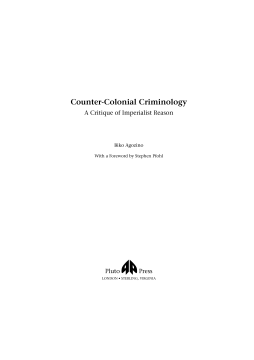
Additional Information
Book Details
Abstract
This book is about how the history of colonialism has shaped the definition of crime and justice systems not only in former colonies but also in colonialist countries. Biko Agozino argues that criminology in the West was originally tested in the colonies and then brought back to mother countries - in this way, he claims, the colonial experience has been instrumental in shaping modern criminology in colonial powers.
He looks at how radical critiques of mainstream criminology by critical feminist and postmodernist thinkers contribute to an understanding of the relationship between colonial experience and criminology. But he also shows that even critical feminist and postmodernist assessments of conventional criminology do not go far enough as they remain virtually silent on colonial issues.
Biko Agozino considers African and other postcolonial literature and contributions to counter colonial criminology, their originality, relevance and limitations. Finally he advocates a 'committed objectivity' approach to race-class-gender criminology investigations in order to come to terms with imperialistic and neo-colonialist criminology.
'A dazzling body of scholarly work that will fertilise a lasting interest and sustainability of the development of African criminology'
Thoman S. Mosely, University of Maryland Eastern Shore
Table of Contents
| Section Title | Page | Action | Price |
|---|---|---|---|
| Contents | v | ||
| Introduction | 1 | ||
| 1. The Enlightenment and Euro- American Theories of the Judicial Process 13Enlightened Retribution and Utilitarianism | 16 | ||
| The Rational Ideal Type and Orientalism | 22 | ||
| Whose Conscience is the Collective Conscience under Colonialism? | 26 | ||
| From the Micro- Physics of Power to the Bifurcation Thesis | 35 | ||
| 2. From Determinism to Meaning: The Emergence of the Labelling Perspective | 40 | ||
| Theoretical and Historical Background | 42 | ||
| Symbolic Interactionism | 44 | ||
| Phenomenology and Labelling | 45 | ||
| The Power to Name as a Focus | 46 | ||
| An Assessment of the Labelling Perspective | 47 | ||
| 3. From Societal Reaction to Questions of Power: From Labelling to Radical Criminology | 50 | ||
| From the Symbolic to the Structural | 50 | ||
| Back to Classical Marxism | 51 | ||
| Practical Implications | 54 | ||
| A Critique of Critical Criminology | 56 | ||
| What is New about New Realism? | 57 | ||
| Realism, Neoclassicism and Sociological Determinism | 58 | ||
| The Examples of Counter- Colonial Crminology | 60 | ||
| 4. Feminist Perspectives and Critical Criminology 63Feminist Empiricism | 64 | ||
| Standpoint Feminism | 66 | ||
| Postmodern Feminism | 72 | ||
| 5. Lesbian Rape: Maternal Metaphors for the Patriarchal State and International Conflict Resolution | 75 | ||
| The Literature of Rape | 78 | ||
| The Sisters Do It for Themselves | 82 | ||
| 6. Poststructuralism and Positivism in Criminological Theory | 92 | ||
| 7. Social Fiction Sui Generis : The Fairy Tale Structure of Criminological Theory 103Tensions between Facticity and Validity 103The Murder of Reality | 108 | ||
| The Fictional Character of Criminological Theory | 110 | ||
| 8. Executive Lawlessness and the Struggle for Democracy in Africa 113What is Crime and What is Punishment? | 114 | ||
| Democracy, Law and Order as Organised Violence | 121 | ||
| Realism, Authoritarianism and Decolonisation | 130 | ||
| Democracy as Redress for Victimised Society | 134 | ||
| 9. Radical Criminology in African Literature | 140 | ||
| The Problem of Crime | 141 | ||
| What is Crime and What Causes Crime? | 145 | ||
| How is Law Related to Society? | 150 | ||
| How Should Society Respond to Offending Behaviour? 153Discussion and Conclusion | 155 | ||
| 10. Committed Objectivity in Race Class Gender Research | 157 | ||
| Race Class Gender Identity in Research | 161 | ||
| Objectivity is not Positionlessness 163The Example of the Institute of Race Relations | 169 | ||
| What is Committed Objectivity? | 171 | ||
| 11. How Scientific is Criminal Justice? A Methodological Critique of Research on McCleskey v. Kemp and Other Capital Cases 173The Case of McCleskey | 174 | ||
| Investigation and Adjudication as Research | 176 | ||
| Science has No Room for Finality | 178 | ||
| A Scientific Argument Against the Death Penalty | 180 | ||
| A Critique of Criminological Research on the Death Penalty | 182 | ||
| Mumia Abu- Jamal: Another Ken Saro- Wiwa? | 187 | ||
| Conclusion: How Scientific are Criminal Justice Sciences? | 190 | ||
| 12. What is Institutionalised? The Race Class Gender Articulation of Stephen Lawrence | 194 | ||
| The Sociology of Institutionalisation | 197 | ||
| Institutionalised Racism Sexism Classism | 202 | ||
| A Letter from Harlem | 204 | ||
| Windrush : A Law and Social Justice Workshop | 207 | ||
| Conclusion | 211 | ||
| 13. Criminal Records: The Toughest, the Police and the Thieves: The Policing of Peter Tosh and Popular Culture | 214 | ||
| Everyone is talking about crime, crime, tell me who are the criminals Tosh | 215 | ||
| I am wanted dred and alive, no place to hide Tosh | 217 | ||
| Get up stand up, stand up for your rights Tosh and Marley | 220 | ||
| Conclusion: Groundings | 223 | ||
| Conclusion: Beyond Criminological Orientalism | 228 | ||
| Bibliography | 247 | ||
| Index | 266 | ||
| Abacha, General Sani, | 187 | ||
| 187-8 | 187 |
